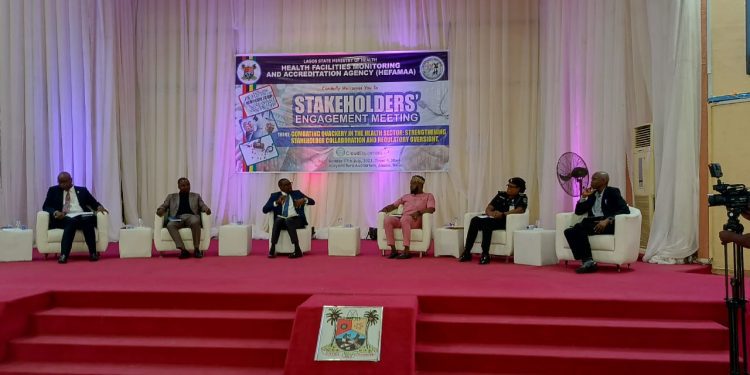The Health Facilities Monitoring and Accreditation Agency (HEFAMAA) has demonstrated a commitment to strengthen its existing collaboration with stakeholder groups across Lagos State with the aim of combatting quackery in the health sector in the state.
HEFAMAA which is an agency of government responsible for accrediting and monitoring public and private health facilities in Lagos, has within the first half of 2023 closed down 40 healthcare centres because of different infractions.
The agency, however, believes that more needs to be done to ensure that every resident of Lagos has access to quality healthcare services.
While speaking to journalists at the Stakeholders’ Engagement Meeting with the theme: “Combatting Quackery in the Health Sector: Strengthening Stakeholder Collaboration and Regulatory Oversight”, the Executive Secretary of HEFAMAA, Dr. Mrs. Abiola Idowu explained that the stakeholders’ engagement is necessary to ensure that the standards set by HEFAMAA are being complied with.
Dr. Idowu said “we need to continuously build our collaboration and partnerships to ensure that our stakeholders understand our position and understand what we need them to do in terms of compliance to the standards that we have set.
“On the other hand, we need to take their views, understand what they are going through, and see how we can come together to ensure that each health facility is providing quality healthcare to the citizens of Lagos State. It is one thing to set standards and it is another thing to ensure that those standards are adhered to,” she added.
Dr. Mrs. Yemisi Solanke ‘Koya, the Chairman of HEFAMAA, who shared that the agency frowns against quackery, noted that its implications are numerous and detrimental to society.
Dr. ‘Koya also noted that quackery is not done by those who are not professionals only, but includes those who claim expertise in fields or medical practice where they are not experts.
She said that “quackery thrives when there is a lack of understanding on the part of the consumers.”
Delivering his keynote speech, titled “Understanding the Nature and Scope of Quackery in the Health Sector”, Professor Akin Obisogun explained that the main drivers of quackery are “ignorance of consumers, desperation, and ungoverned healthcare spaces.”
Prof Obisogun stressed that quacks, and even professionals, do not like regulators and monitors because they always aim to rip off members of the public.
He thereafter appealed for stronger collaboration with relevant stakeholders to ensure that quackery is nipped in the bud.
For his part, Barr. Ayo Adebusoye, the Chairman, Board of Trustees at the Lagos Civil Society Participation for Development (LACSOP), harped on the need for professional associations to also do more self-regulation as they can easily identify their members and ensure the necessary things are done.
Adebusoye mentioned that professional associations are also like non-profit associations incorporated under the Companies and Allied Matters Act, whereby they have up to 43 statutory regulations which impact them, and self-regulation is one of the important things they must do.
He thereafter noted that “if the professional associations want to combat quackery, they must adopt self-regulations, implement and enforce sanctions against erring members.”
Corroborating him, the Director of Public Prosecutions, Dr. Jide Martins, noted that “in the discharge of its functions, HEFAMAA must liaise with parent bodies such as the Medical and Dental Council of Nigeria, Nigeria Medical Association, Federal Ministry of Health and other States’ Ministries of Health and Association of Nigerian Private Medical Practitioners (ANPMP).
“HEFAMAA must collaborate with Nigeria Medical and Dental Council of Nigeria (as records of qualified practitioners are kept with them), colleges of Medicine and teaching hospitals. There should also be a collaboration with the Ministry of Justice, the Nigeria Police as well as other Law enforcement agencies.”

